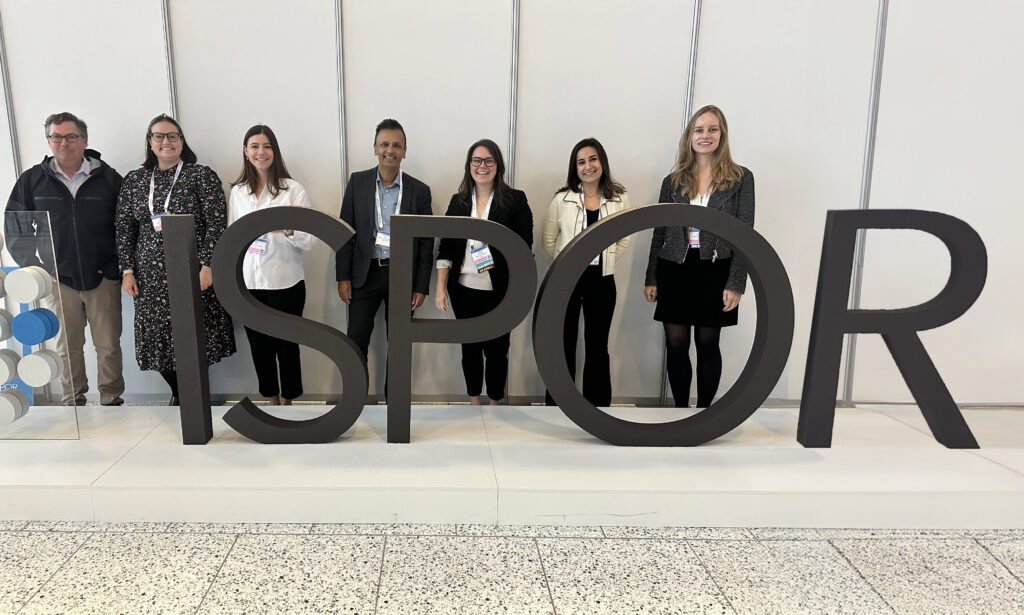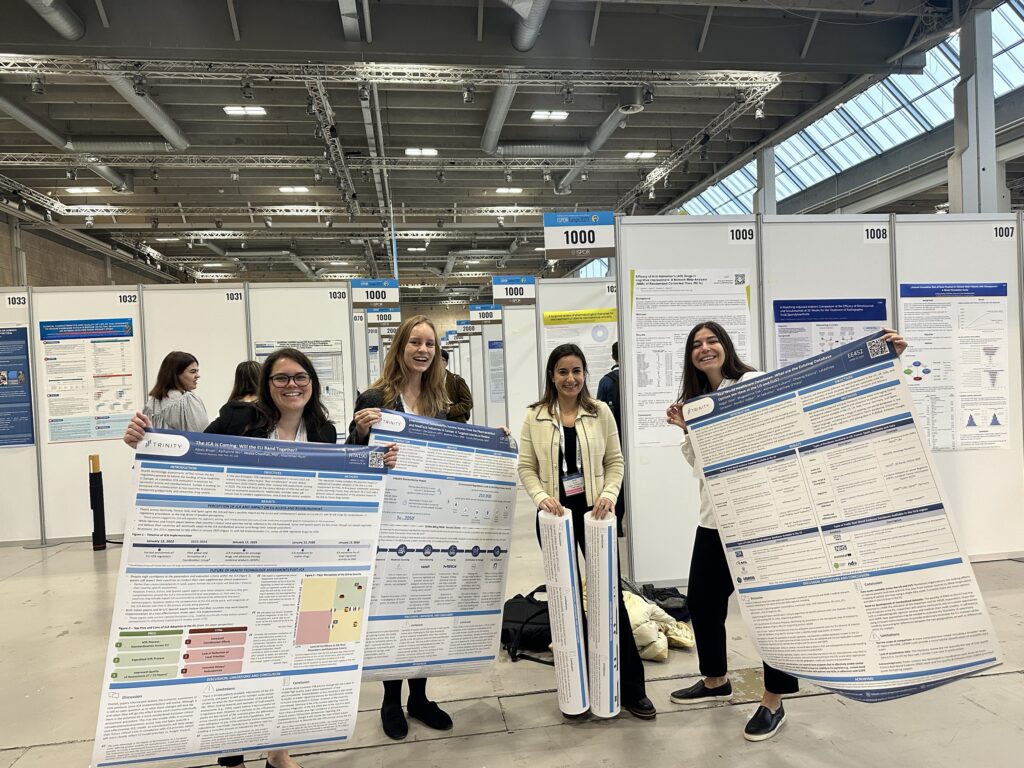Home / Intelligence / Blog / Key Takeaways and Learnings from ISPOR Europe 2023
Published December 7, 2023
Trinity Life Sciences recently attended the ISPOR Europe 2023 conference in Copenhagen, Denmark. The main theme of the conference was “HEOR at the Nexus of Policy and Science,” and the event featured unique discussions and workshops across different stakeholders from both academics and the life sciences industry, including manufacturers, regulatory leaders and health economists, to consider the latest challenges and opportunities being addressed by health economics and outcomes research. Topics included Joint Clinical Assessments (JCAs), access to innovative therapies, environmental sustainability, the use of Artificial Intelligence (AI) and advanced therapy medicinal products (ATMPs) and technologies, among others.
A highlight for Trinity Life Sciences was presenting eight posters, including posters that addressed healthcare policies through a broader pricing and access lens (1, 2, 3, 4) and posters focused on evidence generation and real-world evidence (1, 2). One Trinity poster focused on environmental sustainability and the practical application of HEOR methodologies to quantify our industry’s impact and efforts to address global environmental sustainability challenges. Trinity’s team was present throughout the conference to hear the latest from other researchers, industry leaders and sponsors.


Here are our key takeaways from ISPOR Europe 2023:
1. The Impact of Joint Clinical Assessments
Further Alignment of JCA Frameworks Required: The impact of the JCA on Heath Technology Assessment (HTA) processes across Europe generated substantial discussion throughout the conference. The JCA aims to consolidate HTAs across Europe, but concerns have been raised about how it may affect national decision-making and access to innovative therapies. One recurring theme the Trinity team heard was that the methodology of the JCA needs to be refined to streamline the number of PICO schemes (Population, Intervention, Comparison and Outcomes) and ensure that the different HTA bodies across Europe use consistent definitions for the components, such as supportive care. (click here and here for Trinity’s posters on JCA).
Potential Access Impacts to Innovative Therapies: Delays in access to medicines may be exacerbated by national HTA bodies deciding whether to leverage or ignore the JCA. National HTA bodies may selectively use elements of the JCA that align with their needs, which could lead to further discrepancies in the HTA processes across Europe. For example, German stakeholders at ISPOR shared the impression that the G-BA will largely rely on its own ‘tried and tested’ frameworks instead of leveraging the JCA, due to concerns over the JCA leading to delays in the current fast access to medicines in Germany. Therefore, stakeholders must prioritize the creation of standardized metrics that align the different HTA processes in Europe. Access to medicines may be delayed due to predicted reductions in default exclusivity periods, with longer periods locked by specific conditions, such as launching in all EU member states and meeting high or very high unmet needs criteria.
2. Environmental Sustainability
Several presentations highlighted growing interest in using economic evaluation techniques to quantify the environmental impact of different treatment options. Although there are no standardized methodologies yet, many speakers discussed how HTAs may consider the environmental impact of treatments/incorporate sustainability metrics into their evaluation processes. (environmental sustainability)
3. Optimizing Evidence Review with Artificial Intelligence
The rapid emergence of AI and its potential role(s) in health economics and outcomes research was also a key discussion topic. Multiple presentations provided tangible examples of how AI can optimize evidence review and model adaptation, leading to efficiencies and more robust results in studies. The use of AI in systematic literature reviews, network meta-analyses and economic modeling was also discussed.
4. Advanced Therapy Medicinal Products
The conference demonstrated an increased focus on ATMPs. With more chronic diseases and accompanying therapies emerging, there is an increasing opportunity to provide effective treatments to broader patient populations. While this is an exciting next step for optimal patient management, it has led to increasing concerns around their value versus standard of care, as RCTs, SATs or H2H data versus standard of care are generally included as part of the clinical development plan of ATMPs. Managing the budget impact and uncertainty associated with ATMPs and how stakeholders can work together to ensure timely access to these transformative therapies were the subject of multiple presentations during the conference.
Overall, the ISPOR Europe 2023 conference reflected the need for stakeholders to come together and address emerging challenges related to new policies and technologies to work towards a more effective, efficient and sustainable healthcare system.
What were your key takeaways from ISPOR Europe 2023?
If interested in learning more about this conference or Trinity’s capabilities contact info@trinitylifesciences.com
Authors: Matt O’Hara, Jeff Skaar, Andreia Ribeiro, Sri Saikumar, Abby Silber, Monica Martin De Bustamante
Related Intelligence
Blog
NRDL 2024: Rare Diseases Deep Dive
China’s pharmaceutical landscape is not only vast in scale but also rapidly evolving with an emphasis on balancing access with affordability. This year’s NRDL update stands out. The introduction of the value rating system continues to raise the bar for clinical innovation, rewarding innovation that truly addresses unmet needs and demonstrates clear differentiation. The National […]
Read More
Blog
Joint Clinical Assessment in the EU: What Life Sciences Companies Need to Know
March 2025 marked a pivotal moment for pharmaceutical and biotech companies operating in the European Union (EU) as the first two molecules began to proceed through the Joint Clinical Assessment (JCA) process. At a recent seminar hosted by Trinity Life Sciences, stakeholders gathered to explore the implications of this new regulatory framework and how to […]
Read More
Blog
Pricing and Access in Germany: Innovation and Strong Evidence Rewarded
Germany’s Medical Research Act (Medizinforschungsgesetz or MFG), which came into force on October 30, 2024, is a major legislative reform aimed at strengthening Germany’s position as an attractive environment for medical innovation and pharmaceutical development. The act provides for confidential negotiated drug pricing, incentives for local clinical trials, simplified clinical trial approvals and harmonization of […]
Read More
